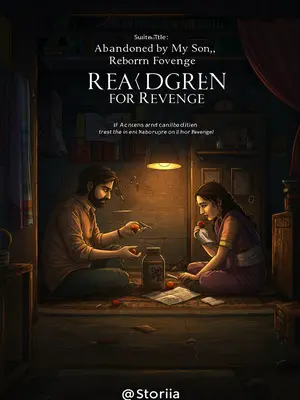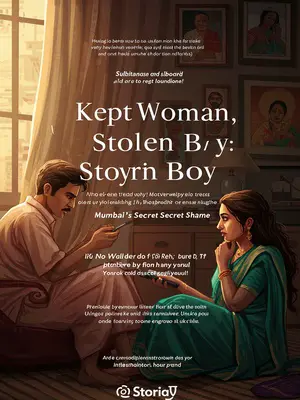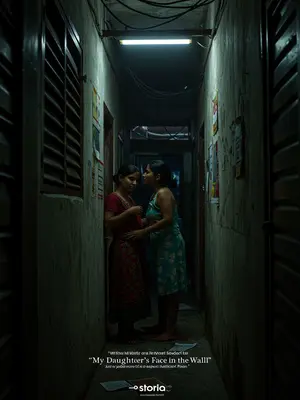Chapter 2: Watching Meera
Every day, I peered through the small hole at the woman next door. Her name was Meera.
It became a sort of ritual for me. Before breakfast, after maggi or chai, and even while waiting for my turn in the common bathroom, I’d sneak a glance. Meera. The name sounded soft, almost like a line from a song. She moved through her flat with a lightness, sometimes humming along to whatever serial was playing on her TV, the sound seeping through the plaster like the smell of frying onions from the kitchen.
Meera was young, with fair skin and a doll-like face framed by long, permed hair—both mature and adorable at the same time. She didn’t work; she spent her days at home watching TV serials and occasionally went out shopping. At home, she dressed casually, often in pink cartoon pyjamas. She was stunning—the kind of beauty you can’t forget after seeing her once.
Sometimes, I’d see her sitting by the window, sunlight falling across her face, the pink pyjamas with cartoon prints making her look like a kid lost in dreams. She’d twist her hair up and tuck it into a loose bun, sometimes adjusting her dupatta absentmindedly. The TV would be blaring some overdramatic saas-bahu drama—Shagun or Yeh Rishta Kya Kehlata Hai—while she scrolled her phone, legs curled up, a steel plate with leftover poha by her side. Anyone passing in the hallway would glance in and think: what a pretty girl, she could have been in films.
Her husband, Uncle Harish, ran a restaurant downstairs called Harish’s Matka Kitchen. The neighbours all called him Harish Bhaiya. He looked every bit the chef: square-faced, buzz cut, broad-shouldered and thick-waisted, always grinning at everyone. He was over forty, a bit greasy, street-smart, but hardworking.
Harish Bhaiya’s laugh was legendary—booming, sometimes echoing up the stairwell as he bantered with the colony’s watchman. He wore those old checked lungis at home, and at work he was always in that oil-stained kurta, a towel draped over one shoulder. He’d call out, “Arrey beta, come, try today’s biryani!” to anyone passing by his eatery. The aunties trusted him, and the bachelors relied on him for their dabba meals. He looked like the kind of man who’d always manage, no matter how hard life got. If he came home late, he’d first wash his face in the corridor basin, spitting out pan masala and humming a Mohammed Rafi song.
Every night at 11:30, Harish Bhaiya would come home, shower, get into bed, and begin their married life right on schedule. He adored Meera—no, he was obsessed, intoxicated by his wife in the way only some men can be. To him, every night in their little world, Meera was the most perfect woman alive.
It was almost as if he was performing some daily ritual, like lighting a diya before a family photo. The regularity of their nights was almost mechanical, yet his affection for Meera sparkled through in small ways—an extra sweet in her tiffin, or his goofy way of massaging her feet when she complained of leg pain. His devotion was obvious, his obsession even more so, something you could feel like the dampness in the monsoon air.
I hid in the darkness, only three or four metres away. In my eyes, the slender and graceful Meera beside Harish Bhaiya looked like a chicken waiting for slaughter next to a fat, strong wolf.
From my side of the wall, everything looked magnified—the contrast between their bodies, the way she seemed to shrink next to him. I’d lie on my creaky bed, the ceiling fan whirring above, feeling my heart thud for reasons I didn’t dare examine. Sometimes, I caught myself pressing my hand to my chest, wondering what kind of world it was, where such beauty could lie next to someone so mismatched, so overwhelming.
They’d turn off the lights to sleep, usually around one in the morning. I had trouble falling asleep. In the stillness, Meera’s image was always before my eyes. She was so close—separated from me by just a wall. Yet so far, so far that maybe I’d never be able to reach her in my whole life.
Often, I’d listen to the auto-rickshaws honking on the street below, the distant call of the nightwatchman, and feel a hollowness inside. I’d tell myself: forget her, it’s none of your business. But her face, half-lit by the glow of her phone, kept hovering in my dreams—unreachable, as if the wall between us was thicker than the walls of any jail.













